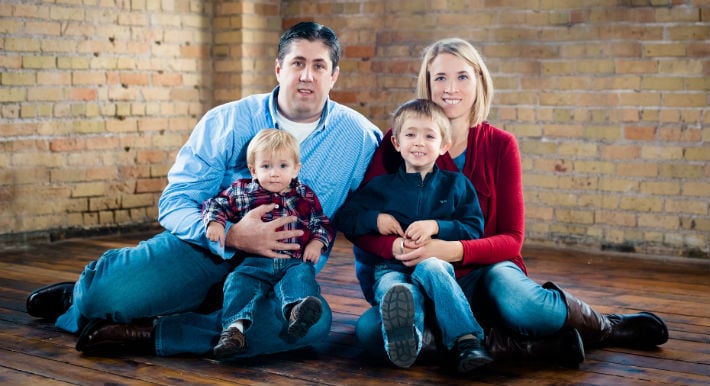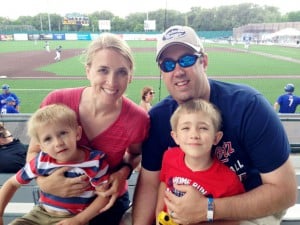
Leah Moore didn’t so much choose a career as she did fulfill a destiny by becoming a teacher.
“I come from a family of teachers,” she said. “Both of my parents were teachers. They both taught for 35 years and then retired. Two of my aunts and my godmother and my godfather were teachers. I was surrounded.”
Moore is in her seventh year as a seventh-grade life science teacher at Proctor ISD’s Jedlicka Middle School near Duluth, Minnesota. She earned a Master of Science in Education in Instruction from the University of Wisconsin-Superior in May 2016.
Moore, who earned a bachelor’s degree from the University of Wisconsin-Superior in 2010, took a mixture of on-campus and online courses for her master’s degree.
“I had taught for five years, and I decided it would be a really good time to go back and learn more so that I could become an even better teacher,” she said. “I had two small children, so with daycare and picking them up and dropping them off, the hybrid fit really seamlessly into my schedule. That was the main reason I was able to do it.”
Not surprisingly, Moore got plenty of encouragement to continue her higher education from her family full of educators.
“My family was very supportive,” she said. “They realized it was the next logical step in my career to get my master’s degree.”
Superior Choice
“
It is so incredible to give students a challenge and to watch them grow — both personally and academically — to achieve their potential.
— Leah Moore, MSE Instruction Graduate
”
Moore initially decided on UW-Superior for a bachelor’s degree program for a couple of solid reasons.
“I looked at all of my options,” she said. “It was a small school. I had friends who went there and had good things to say about their experience going through the education program. When I went and toured the campus, everybody was nice and friendly and they had good facilities. It was all of those things put together.”
Once she was ready to go back to school to earn a Master of Science in Education in Instruction, she had no doubt she would return to the University of Wisconsin-Superior.
“I had a comfort level because I did my undergrad degree there,” she said. “I was familiar with the professors and how things worked. When I looked over the requirements and saw that it was a hybrid and I could do a lot on my own time, it was just really a no-brainer.”
Moore said she thoroughly enjoyed her thesis, which she wrote on her own students. That experience helped her improve as a teacher and develop a deeper connection with her pupils.
“I was able to see that data and use it to guide my instruction,” she said. “I had other friends who went to other schools that didn’t get that freedom and flexibility — they were doing things that weren’t directly applicable. That was most definitely not my experience.”
Moore also had high praise for Dr. Suzanne Griffith, her thesis adviser.
“From the beginning, I realized that Dr. Griffith was passionate about teaching and motivating students to do their best work,” Moore said. “She was incredibly supportive of me as I worked through the process of writing my thesis. As a result, I felt like I was given the confidence to produce a quality thesis.”
Scientific Discovery

Moore found a connection to the subject area she would eventually teach to seventh-graders.
“I’ve always enjoyed the processes of science, but it wasn’t until I had a series of jobs that I realized the connection of what I learned in the classroom to what happens in a real-world situation,” she said. “At the time, I was also working with high school-aged children. I really enjoyed getting to know them, helping them learn a skill and then creating opportunities for them to become the expert. Through these experiences, I came to the conclusion that I wanted to become a classroom science teacher.”
Moore quickly found out she had made the right decision.
“I enjoy the privilege of working day in and day out with the students,” she said. “It is so incredible to give students a challenge and to watch them grow — both personally and academically — to achieve their potential.”
Moore said she hopes to continue having a positive influence on the lives of her students for many more years.
“Teaching in this day and age means being flexible in meeting the needs of individual students,” she said. “My career goal is to continue to find the best way to engage individual students in the learning process.
“I think that the best way is constantly changing with new technology that is being developed. Through my time at the University of Wisconsin-Superior, I met people and had experiences that have served as a springboard for motivating me to continue to grow and apply my knowledge to the classroom.”
Positive Outcomes
Moore, who enjoys gardening, reading and hiking, is glad she made the decision to earn a Master of Science in Education in Instruction. She would also recommend the program.
“I would advise anybody considering this degree to be ready and be prepared to be engaged and set a schedule that works for them in their life,” she said. “It’s a really good experience.”
She is also excited about the opportunities earning a master’s degree leave open for her career.
“Any time a teacher shows growth in their field, that’s an excellent quality to have,” she said. “Every administrator in an interview would want to be looking for a teacher with a continuing eye down that career path.”
Learn more about the UW-Superior online MSE in Instruction program.


